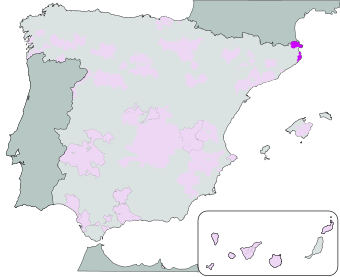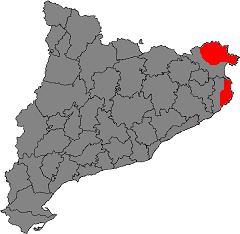Empordà (DO) facts for kids
| Wine region | |

|
|
| Official name | D.O.P. Empordà |
|---|---|
| Type | Denominación de Origen Protegida (DOP) |
| Year established | 1972 |
| Country | Spain |
| Size of planted vineyards | 1,756 hectares (4,339 acres) |
| No. of wineries | 43 |
| Wine produced | 35,965 hectolitres |
| Comments | Data for 2016 / 2017 |

Empordà is a special area in Spain where unique wines are made. It's located in the northeastern part of Catalonia, a region in Spain. The official name for this wine area is "Denominación de Origen Protegida" (DOP). This means it's a "Protected Designation of Origin," ensuring the wines come from this specific place and follow certain rules.
This wine region stretches from the town of Figueres all the way north to the border with France. To the south, it reaches towards the Mediterranean Sea. Important rivers like the Muga, Llobregat, and Manol flow through the Empordà area, heading east to the sea.
Contents
History of Empordà Wines
Archaeologists believe that people first started growing grapevines here around 500 BC. This was thanks to the Phoenicians, who were ancient traders. Later, the Romans and Benedictine monks also helped develop winemaking in the area. The first written record about wine from Empordà dates back to 1130. It was a book about wine written by a monk named Father Pere de Novas.
For a long time, Empordà was known for making strong, sweet wines. These wines were very popular until the 1930s. The region officially became a "Denominación de Origen" (DO) in 1972.
In the middle of the 20th century, most wineries were large cooperatives. They focused on making a lot of cheap wine. But in the late 1990s and early 2000s, things changed. More small, craft wineries started up. They worked hard to make better quality wines. Until 2006, the region was called DO Empordà-Costa Brava. This name linked it to the popular tourist beaches nearby.
Where is Empordà Located?
The Empordà wine region is split into two main parts. The northern part is called Alt Empordà. It's found on the slopes of the Alberes Rodes mountains, close to the French border. The southern part is called Baix Empordà. This area is on the slopes of the Montgrí and Gabarres Massifs.
What are the Soils Like?
The soils in Empordà are usually dark in color. They often contain some lime, which is a type of mineral. The soil is loose, which means water drains away easily. It also doesn't have much organic matter, which is good for grapevines. Near the coast and in the mountains, you can also find granite in the soil.
Empordà's Climate and Weather
The climate here is Mediterranean, which means it has warm, dry summers and mild winters. However, it's also affected by winds. Moist winds come from the south, and cold winds blow from the north. One very important wind is called the Tramontana. This wind can sometimes blow very fast, up to 120 kilometers per hour!
The Tramontana wind is super important for growing grapes. It helps reduce plant diseases like mildew and keeps pests away. This makes it easier for winemakers to grow grapes using organic farming methods.
The average temperature in Empordà is about 16 °C. It can get as warm as 29 °C and as cool as 1.5 °C. The region gets a good amount of rain each year, between 600 and 700 millimeters. Most of the rain falls during winter and spring.
Types of Wines from Empordà
Historically, Empordà was famous for its rosé wines. However, today, most of the wine produced is red, making up about 60% of the total. White wines are 19%, and rosé wines are 17%. The remaining 4% includes traditional wines, like sweet dessert wines made from Grenache and Moscatell grapes.
A little more than half of the wines sold in the region are bottled. The rest are sold in larger quantities, often to other producers. A significant amount of Cava, a Spanish sparkling wine, is also made in approved villages within the Empordà region.
Grape Varieties Grown in Empordà
Winemakers in Empordà use a variety of grapes to make their wines.
- Red Grapes:
- White Grapes:
- Recommended: Garnatxa Blanca / Lledoner Blanc, Garnatxa Roja (Garnatxa Gris), Macabeu / Viura, and Moscatell d’Alexandria
- Authorized: Chardonnay, Gewurztraminer, Malvasia, Moscatell de Gra Petit, Picapoll Blanc, Sauvignon Blanc, and Xarel·lo
Exploring the Empordà Wine Route
Many wineries in the Empordà region have joined together to create the DOP Empordà wine route. This route helps promote wine tourism in the area. It is managed by the Patronat de Turisme de la Costa Brava, along with the Consell Regulador de la Denominació d’Origen Empordà.
The main goal of the wine route is to encourage people to visit the region and learn about its wines. It also brings together other fun activities related to wine and grapes. For example, Celler Peralada is a famous winery known for its modern building and for trying to have a very small impact on the environment while making wine.
See also
 In Spanish: Empordà (vino) para niños
In Spanish: Empordà (vino) para niños
 | Aurelia Browder |
 | Nannie Helen Burroughs |
 | Michelle Alexander |

